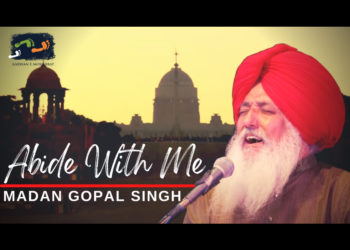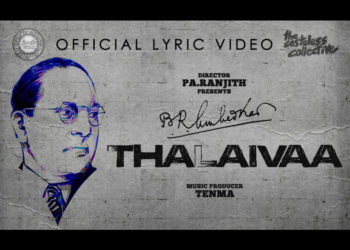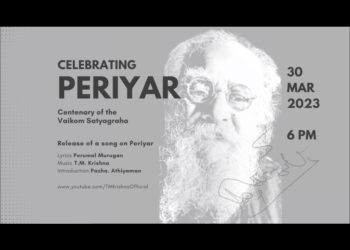Enjoy Enjaami, a Tamil new music-video album released early March 2021, is gaining popularity on several fronts. A rap song by Dhee ft Arivu and music composed by Santhosh Narayan and directed by Amit Krishnan is a product of Maajja, a new platform for independent artists founded by A. R. Rahman and company. The power bank of the video is its lyrics written by Arivu. When I heard the word Énjaami‘, it reminded of my grandmother, who fondly called my brothers as ‘saami’, chaami’ or jaami’, translated as my dear’ or ‘my lord’. A word I hardly heard after my grandmother died. This word intrigued me. As I watched the video and listened to the song, quickly I realised that this is not just a music album, but it can transcend boundaries, cultures and language to share stories of our people, our ancestors, our roots and above all, about our planet.
The deep-rooted meaning of the words in the album emerge from rural Tamil Nadu and its unique way of speaking, which the album portrays beautifully. The stunning visuals, Dhee-Arivu’s voice, and the ‘never-heard-before’ deeply meaningful lyrics will leave you hooked to the screen till the end. It is transcendental. It is very rare that an album has the power to transform you profoundly, both aesthetically and for its more profound meaning about who we are and where have we come from? Who are my fellow brothers and sisters, communities both humans and nonhumans? Enjoy Enjaami is a call for unity, call for solidarity, not among all ethnically diverse people but also plants, land, insects and birds. This song celebrates the social linkages with nature, and it also laments the loss of contact with our roots, our ancestors, and our native land. Cuckcoo…cuckoo repertoire in the album is the call for social and ecological justice.
As an anthem of planetary connections, Enjoy Enjaami, narrates the interlinkages of nature with people, with examples of frogs, algae, birds and animals. The opening scene is the epitome of these entanglements. A dark-skinned hand approaches the trembling ground with the beat of a parai drum, a percussion instrument played by Dalit men during funerals and also used during the dissemination of important messages. As the hand reaches the black soil, the music explodes ‘Cuckoo cuckoo’ and the colourful, earthy visuals with peppy beat unfolding the magic opera. The lyrics and visuals are a reminder of our intimate connection with the earth and its co-beings.
A 5-minute video gives a fresh perspective of what nature is that emphasizes: we are not alone and that we share this earth with others. In other words, we are co-inhabitants. Connections with other creatures are narrated relationally; for example, the caterpillar (kambilipucchi) is the sister (thangacchi), highlighting the human connection with nature as a kin. The feet tapping tune of cuckoo..cuckoo.. is a call to connect, respect and acknowledge the nonhuman world.
Calling the parakeets (annakilli) on the banyan tree or the kingfisher (meenkotthi) in the tree hole are ways to remember our ancestors who gave us the land to live well is one such example of many surprising ways in which the song is written. The streams and ponds are not only ours but also to dogs (naayi), jackals (nari) and cats (poonai). Teaching us a new way to consider the co-beings, the album is an invitation to see the world through the eyes of those who plough the land, those who harvest – the farmers, fishers, potters, weavers whose blood and sweat has paved the way for civilization.
The music video could be read at multiple levels. Highlighting the interdependence and mutual respect of other beings, both social and ecological, are central to this music video. It is a heartfelt tribute to the native communities who live off the land and the various ways they connect with the natural world. The repeated reference to nature, land, and animals is revisiting the world of our ancestors, who created ponds, caught fishes, harvested and hunted animals. Their association with animals could also be seen in kinship terms used in the song, as caterpillars are our sisters. Several marginalized and oppressed communities view their lands and forests as parents and use kinship terms such as siblings, fathers and mothers. For them, connection with the land is strong that it is not just an asset, but a part of their social worlds understood as a network of their association with other humans and nonhumans. Enjoy Enjaami has emerged from the unwritten songs, unlettered stories, unacknowledged and undocumented music passed down through generations. It brings these hidden stories to the foreground. This album is political and evocative.
The music softens a bit, in the middle of the album, to giving way to soulful Oppari (a form of folk-based songs in South India of lamenting and eulogizing, sung during funerals). Arivu’s voice and his lyrics touch you deeply, particularly on these lines: Í planted five trees and created a beautiful garden, the garden is flourishing, but my throat remains parched’. This sums up the harsh reality of many vulnerable communities in the hierarchical caste-based society like India. A larger question is why communities who can connect intimately with forest, lands and animals (Dalits and tribals) are on the margins living a life of destitution facing discrimination and stigmatization. Enjoy Enjaami, like other songs of Arivu, is about social justice and very rightly raises unsettling questions about our society, especially about caste and land.
Even if you don’t understand Tamil, you cannot miss the pain of lamenting: loss of connection to land, dignity, and identity. Grieving is both cathartic and hopeful. The album ends with the celebration narrating that the plants are fruiting again, the seeds are germinating, and the seeds left by our fathers and mothers are sprouting back. Enjoy Enjaami is a musical reminder of the struggles of our ancestors, of our roots and of our land.




